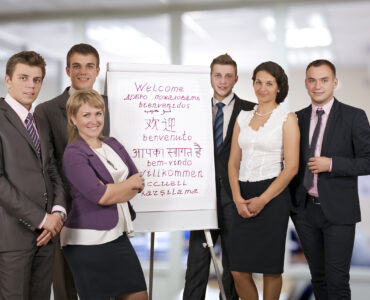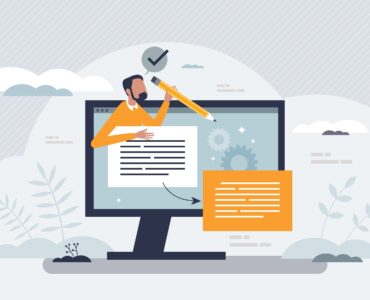by David Grunwald
I tuned in yesterday to the online TAUS webinar entitled: ChatGPT and the Takeaways for the Translation Industry. Here are my impressions:
About the Webinar
In this webinar on the ChatGPT and the Takeaways for the Translation Industry, Arul Menezes (Microsoft), Christian Federmann (Microsoft), Wayne Bourland (Dell), Georg Kirchner (Dell), John Tinsley (Translated), Alessandro Cattelan (Translated), and Jaap van der Meer (TAUS) shared their perspectives on the following questions:
* How do we scale up to literally translate everything?
* What does it mean to implement a MT First strategy?
* How do we get our own translation memory data in order and put it to smart use in combination with the LLMs?
This is the webinar description and agenda from the TAUS website.
My Grade of this Webinar
I would give the webinar a grade of D minus. If you are not familiar with the US grading system, this comes to about 45/100.
Stuck in a Time Warp
The first time I met TAUS founder Jaap van der Meer was over 20 years ago while in Berlin for a LocWorld conference. It was one of the first-if not THE first-TAUS conference. And it’s as if I fell asleep and woke up 20 years later. The talking points have not changed by much: Is MT ready to take over human translation? How to train MT (or now it is LLMs). Leveraging legacy MTs. Which texts are suitable for MT? Some of the terms have changed but the tune is still the same.
Mumbo Jumbo
I have been in this industry for nearly as long as Jaap. But I found little to interest me or get excited about during any of the panel discussions. 99% of the discussion was not useful for anyone unless they work as an MT scientist at a large tech company.
And how exciting is that? Crunching data endlessly all for the sake of saving a few bucks for companies with Trillion-dollar valuations. And those positions are dead-end jobs. One of the panelists is a name I have been hearing from my day 1 in the biz. He is touted as a rock star in the field but in reality, he is just a lifer at one of the big tech companies. Not that there is anything wrong with that, just that it goes to prove that the career prospects of an MT guru at big tech companies are not great.
What’s in it for me?
Listening to the mumbo jumbo yesterday, I tried hard to find something that would benefit me as an LSP manager/owner. And as hard as I tried, I found very little. Because if you work at Dell or Microsoft, you have the resources to develop and maintain large scale MT systems or LLM (Large Language Models).
As an LSP you deal with many different types of material. So, developing a catchall MT for all of your clients may be challenging. As a big tech, the material is mainly focused on one specific area. Also, confidentiality may also be an issue for LSPs when building MT systems. There were two panelists from Translated, one of the industry’s largest LSPs. But I did not hear anything specific from them on how LSPs can benefit from the advances in LLM technology.
What’s in it for customers?
The benefits of AI seem to favor the huge tech companies that translate millions of words a day. But what about the small and mid-size customers that need to translate a contract, an employee handbook, an SDS or a technical manual? The customers that translate 50-100,000 words a year? How can they benefit from AI? Can they save a lot of money by going to an LSP that uses AI? Will they compromise quality as a result? My guess is that those customers do not care enough to learn the difference between a workflow with AI/MT or without. I am also not sure that AI is a good selling point for LSPs that are selling to those customers. Clearly there are some higher tier customers who could benefit from the reduced costs and increased throughput that can result from using AI MT. But I don’t feel that they or the LSPs that are selling to them would benefit from the webinar.
What about ChatGPT?
The title of the webinar led me to believe that ChatGPT would be discussed in-depth. But ultimately, the webinar had almost nothing to do with ChatGPT. I myself am curious to know what is the difference between machine translation systems and language models when it comes to translation. Is there a difference? Are they the same and if not, is one better than the other? I don’t know the answer. And after yesterday’s webinar, I still don’t know the answer. I assume that the panelists do know the answer, and it may even be trivial. But not for people who are not NLP scientists.
Using LLMs for Proofreading MT
This was the only thing that I found interesting in the webinar. Can ChatGPT or other AI language models be able to proofread and edit MT output? Or for that matter, can LLMs be able to proofread its own translation? Some of the panelists seem to think so. Once that happens, it will be over for 95% of the world’s translators.





